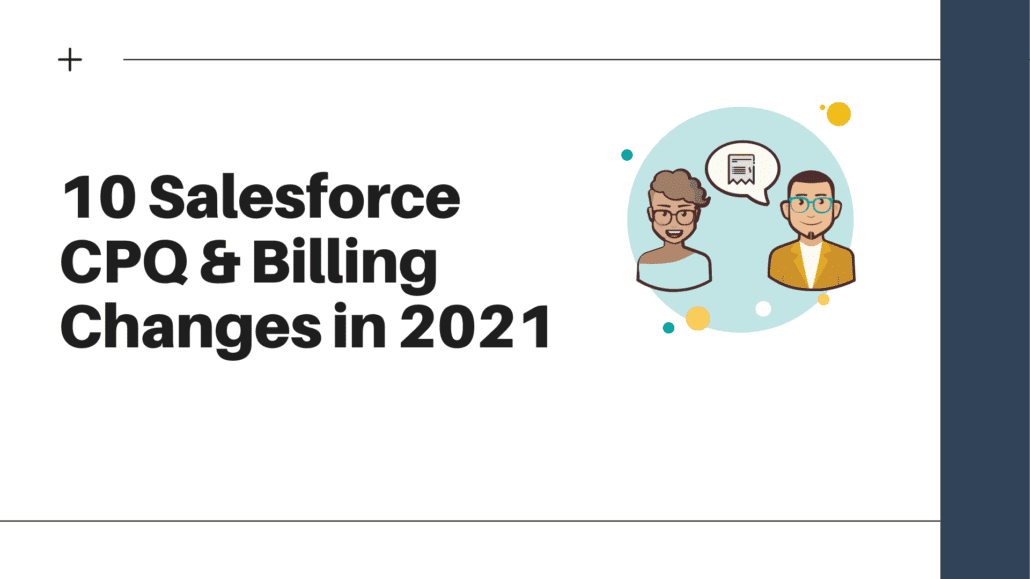10 Salesforce CPQ and Billing Changes in 2021
Salesforce CPQ and Billing changes are around the corner, and Spring ’21 has Salesforce Revenue Cloud users excited. Check out the latest and greatest from Salesforce CPQ and Billing (and Advanced Approvals too!)
Salesforce CPQ
1. Contract Larger Orders in Less Time
When your sales reps contract an order, Salesforce CPQ can now create a contract with twice as many line items as it could previously. The number of line items depends on your org’s configuration.
2. Make a Smooth Switch to the Large Scale Amendment and Renewal Services
Your users can now complete amendment and renewal transactions regardless of which amendment and renewal service you use. Previously, if field names on your contracts were long, you couldn’t switch from the Legacy Amend/Renew Service to the Salesforce CPQ Large-Scale Amendment and Renewal Service.
3. Continue Working While You Amend Contracts
When you select a new option in the package setup, your users can now continue working in Salesforce while a contract amendment is in progress. Previously, users waited for the contract amendment process to finish. The new option is available when you deselect the option for the legacy service and use the Salesforce CPQ Large Scale Amendment and Renewal service instead.
4. Configurator Evaluation Event Field Added to the Price Rules Page Layout Continue Working While You Amend Contracts
By default, the configurator evaluation event field is now included on the Price Rules page layout. It gets added automatically to save you a step and to ensure that your users select the required value when they configure a price rule.
*This change is available to customers who purchased Salesforce Shield or Event Monitoring and Shield Platform Encryption add-on subscriptions.
Salesforce Billing
5. Create Partial Periods When Using a Bill Through Date Override
Control how your invoice lines reflect your billing periods after using Bill Through Date Override. We added the billing rule field Period Treatment for BTDO, which controls how Salesforce creates invoice lines when a Bill Through Date Override value creates a partial billing period. Previously, Salesforce Billing created only one invoice line covering the partial period and any remaining full periods.
6. Use New ERP-Mapping Fields for Finance Transactions
Give your finance users more control over tracking general ledger (GL) and finance period information on their finance transactions. Then they can easily map the transactions to their downstream ERP systems for accounting close processes.
7. Understand the Long-Term Value of Each Lifecycle-Managed Asset
A new Total Lifecycle Amount field shows the total of a lifecycle-managed asset across its initial sale, amendments, renewals, and other changes. As of Spring ’21, the field is populated on all lifecycle-managed assets. On other assets, it’s null. Use field-level security to add the field to layouts, and take advantage of it in reporting.
8. Standalone Order Activation Logic Was Updated
Salesforce Billing now activates standalone orders and their child standalone order products at the same time. Previously, when you activated a standalone order, Salesforce Billing didn’t activate its order products. Users had to activate the standalone order products on their own or through automation.
9. Standalone Order Product Creation Logic Was Updated
Standalone order products no longer require as much editing after creation. Now, when you create a standalone order, its child order products inherit the product’s charge type, billing frequency, and billing type. If any order products were related to a product with a product consumption schedule and rates, the order products also receive order product consumption schedules and rates.
10. Automatic Usage Summaries for Evergreen Usage-Based Subscriptions
Improve the usage pricing experience for sales reps working with evergreen subscriptions. Sales reps can now upload usage to an active evergreen subscription order product at any time. If the usage’s processing date doesn’t fall within one of the order product’s active, uninvoiced usage summaries, Salesforce Billing creates a usage summary and assigns it the new usage.
Advanced Approvals:
Your Advanced Approvals users can manage their approvals without logging into Salesforce. Now approval and rejection API is exposed from the Advanced Approvals package.
Conclusion:
With an automated, end-to-end, quote-to-cash-solution, expect your business to see accelerated sales cycles, more closed deals, and quicker revenue recognition.
Already have Salesforce CPQ? Check out “Life after Launch: 8 Ways to Maximize your Salesforce CPQ Investment”
Pinkus Partners is a Salesforce consulting and staffing firm in the US, specializing in lead-to-cash acceleration and revenue generation. Leveraging our active Talent Network, proprietary data, and built-in automation, we deliver proven and reliable solutions for our clients and partners. Connect with a Salesforce CPQ Consultant.

